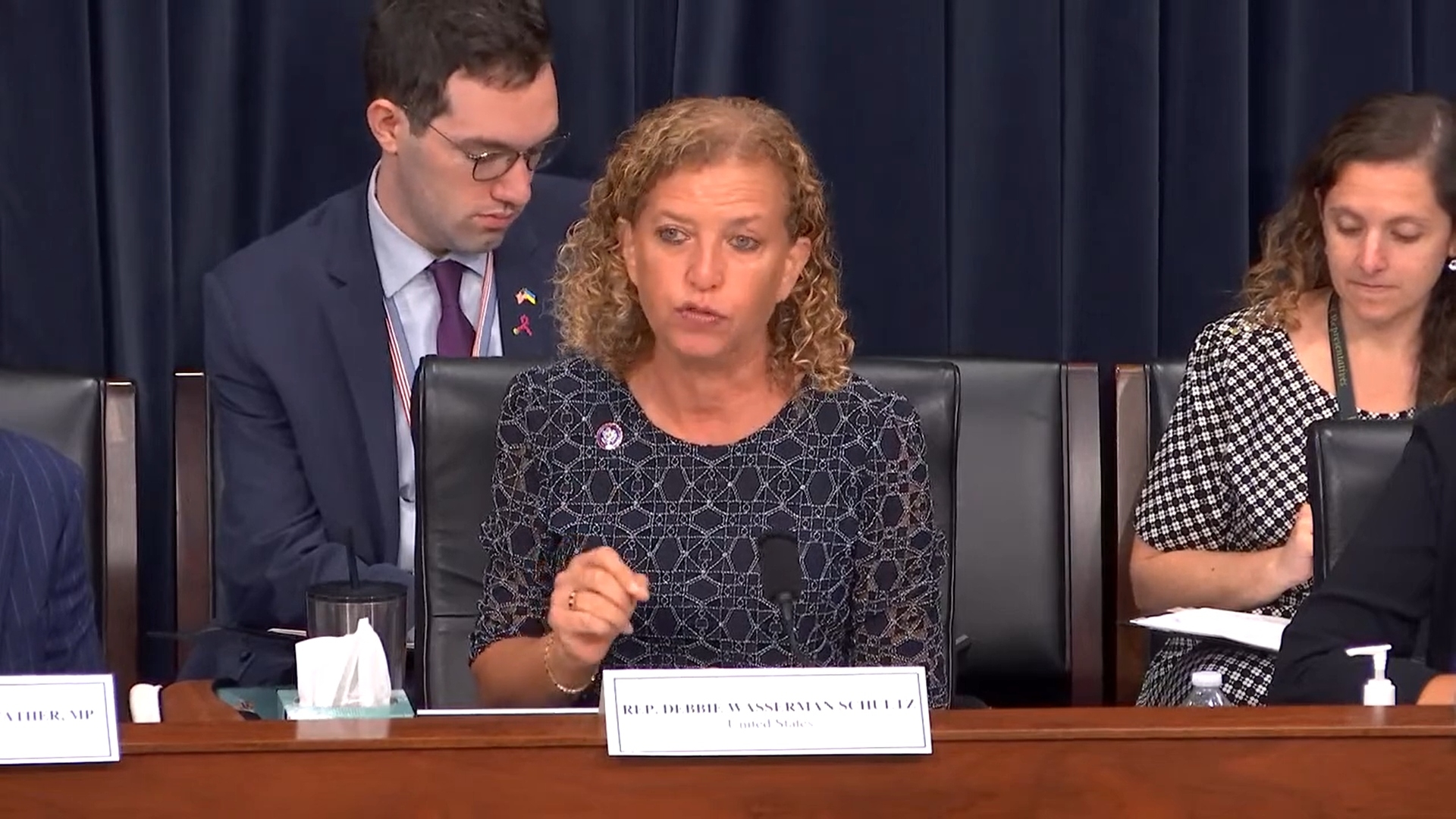WASHINGTON (JTA) — The lawmakers thanked the representatives from the social networks giants for attending the Capitol Hill hearing on antisemitism — after all, it was not an official congressional hearing and no one was obliged to turn up.
But then, after some tense exchanges last Friday, things got acrimonious quickly: Rep. Debbie Wasserman Schultz, the Jewish Florida Democrat who convened the hearing, said that the tech reps’ stonewalling on whether and how antisemitism would be treated will lead to congressional action.
“We’re all starting to see — anyone watching this — why we’re eventually going to have to regulate the way that this content is handled, as opposed to just leaving it to you, the companies, to comply, to make sure you’re complying with standards that really aren’t very transparent,” she said.
The panel, the Interparliamentary Anti-Semitism Task Force, is comprised of lawmakers from diverse countries, including the United States, Canada, South Africa, Israel, Sweden and New Zealand, and it has no real powers. But some of the individual lawmakers are members of governing parties and are able to take legislative action at home.
Wasserman Schultz, for instance, is a past chairwoman of the Democratic Party and is currently on two of the House of Representatives’ most powerful committees, Appropriations and Oversight. Likewise, Anthony Housefather, a Jewish member of parliament from Montreal, who is a member of Canada’s governing Liberal Party, has senior oversight roles.
Wasserman Schultz’s frustration came after Housefather was unable to elicit a commitment that the social media companies would label antisemitism as hate speech and take action to remove the phrase “Jews are all white nationalists who support Apartheid” from posts on their platforms.
Kevin Kane, the director of government affairs for YouTube said “that’s definitely something we’d want to look at,” but “it’s difficult to say in the abstract.” Representatives from TikTok, Twitter and Meta, the parent company of Facebook and Instagram, gave similarly noncommittal answers.
Housefather said the answers were “pretty disturbing.” Much of the first part of the panel had focused on the degree to which anti-Israel or Israel-critical comment is antisemitic, and the lawmakers and a group of experts enthusiastically promoted the definition of antisemitism advanced by the International Holocaust Remembrance Alliance, which some liberal groups see as too broad. Housefather said he was substituting “Jews” for “Zionists” in his hypothetical as a means of addressing concerns about whether attacking “Zionism” is antisemitic.
Housefather’s hypothetical was also an allusion to the difficulties Canadian Jewish advocates had in getting Twitter to ban Laith Marouf, a Canadian pro-Palestinian advocate whose tweets included “You know all those loud mouthed bags of human feces, a.k.a. the Jewish White Supremacists; when we liberate Palestine and they have to go back to where they come from, they will return to being low voiced bitches of Christian/Secular White Supremacist Masters” and “I have a motto: Life’s too short for shoes with laces or entertaining Jewish white supremacists with anything but a bullet to the head.”
Michele Austin, Twitter’s director of public policy for the United States and Canada, was unable to explain why Marouf was allowed to return to Twitter with a different handle after having been banned from the platform in August. (Marouf was at the center of a controversy when it was revealed last month that an ostensibly antiracism organization he works for was receiving Canadian government money; the government eventually withdrew the funds.)
Another tense exchange between Austin and Michal Cotler-Wunsh, a former Israeli parliament member, had to do with the tweets of Iran’s Supreme Leader, Ayatollah Ali Khamenei, who routinely tweets antisemitic content and calls for Israel’s destruction. Cotler-Wunsh asked why Khamenei’s tweets remain up.
“What you are referring to is the world leaders policy, and I was very happy to hear a number of the comments from the envoys and the ambassadors with regard to this issue,” Austin said, without elaborating what Twitter’s “world leaders policy” was.
Wasserman Schultz was similarly frustrated when the social media representatives would not answer with specifics about what causes delays in the removal of hateful content.
The degree of frustration among the lawmakers was most evident at the end of the panel, when Wasserman Schultz scolded the companies for offering panaceas about promoting Holocaust remembrance. Eric Ebenstein, the director of public policy at TikTok, had listed a number of Holocaust commemorations the platform had promoted.
“Each of you in some way mentioned your pride in acknowledging Yom Hashoah and other specific Jewish holidays,” Wasserman Schultz said, referencing Israel’s Holocaust remembrance day. “Antisemitism is a viral toxic infection that drives real-world violence. And for you to only scratch the surface or to pander and use examples of, you know, like ‘some of your best friends are Jews’ is insulting and frustrating. So I would just suggest in the future when you’re testifying on this topic that perhaps you might not want to use those kinds of examples.”
JTA has documented Jewish history in real-time for over a century. Keep our journalism strong by joining us in supporting independent, award-winning reporting.






